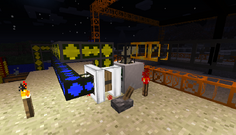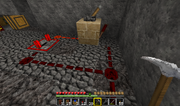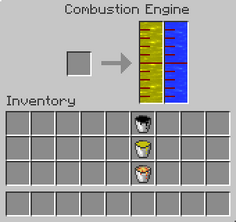m (elaborated on the danger of leaving a combustion uncooled) Tag: Visual edit |
Tag: Visual edit |
||
| (32 intermediate revisions by 26 users not shown) | |||
| Line 1: | Line 1: | ||
__NOTOC__ |
__NOTOC__ |
||
| ⚫ | [[File:Combustion-engine.png|thumb|236px|Combustion engine powering a quarry.]]The '''Combustion Engine''' is the highest tier of buildcraft [[Engines|engine]]. It can convert [[oil]] or [[fuel]] into MJ at a rate of 3MJ/t and 6MJ/t respectively, making it the most powerful of the three buildcraft engines. However, unlike engines from the lower tiers a combustion engine requires [http://minecraft.gamepedia.com/Water water] to maintain a safe temperature and will continuously drain its internal water tank once it reaches the maximum safe operating temperature. If a combustion engine runs out of water, it will begin to heat up and breakdown. |
||
| − | [[File:Combustion-engine.png|thumb|236px|Combustion engine powering a quarry.]] |
||
| ⚫ | The Combustion Engine is the highest tier of buildcraft [[Engines|engine]]. It can convert [[oil]] or [[fuel]] into MJ at a rate of 3MJ/t and 6MJ/t respectively, making it the most powerful of the three buildcraft engines. However, unlike engines from the lower tiers a combustion engine requires [http://minecraft.gamepedia.com/Water water] to maintain a safe temperature and will continuously drain its internal water tank once it reaches the maximum safe operating temperature. |
||
Combustion engines provide enough power to draw full stacks when used on a [[Wooden Pipe]] and move a [[Quarry]] without delays between each action. |
Combustion engines provide enough power to draw full stacks when used on a [[Wooden Pipe]] and move a [[Quarry]] without delays between each action. |
||
| − | In versions of |
+ | In versions of Buildcraft prior to 4.1.0, combustion engines were also able to convert [http://minecraft.gamepedia.com/Lava lava] into MJ at a rate of 1MJ/t. In further versions you can still use lava as fuel in [[Stirling Engine]]s. However, the ability to use lava as fuel for combustion engines was removed. |
| + | You may use a wrench to fix it when it is broken. Just shift right-click it. |
||
| ⚫ | |||
| ⚫ | |||
{{Grid/Crafting Table |
{{Grid/Crafting Table |
||
|A1=Iron Ingot |A1-link=Non-BC Items |
|A1=Iron Ingot |A1-link=Non-BC Items |
||
| Line 20: | Line 20: | ||
|Output=Combustion Engine |
|Output=Combustion Engine |
||
|float=right|nobreak=nobreak |
|float=right|nobreak=nobreak |
||
| ⚫ | |||
| − | }} |
||
| ⚫ | |||
* 3 x [http://www.minecraftwiki.net/wiki/Iron_ingot Iron Ingot] |
* 3 x [http://www.minecraftwiki.net/wiki/Iron_ingot Iron Ingot] |
||
* 2 x [[Gears|Iron Gear]] |
* 2 x [[Gears|Iron Gear]] |
||
| Line 28: | Line 27: | ||
Produces: 1 x Combustion Engine |
Produces: 1 x Combustion Engine |
||
| − | See: [http:// |
+ | See Also: [http://crafting-guide.com/browse/buildcraft/combustion_engine/ Crafting Guide] |
| + | ==Tutorial / Demonstrative Videos== |
||
| − | ==Set Up Demonstration== |
||
| ⚫ | |||
| − | |||
| ⚫ | |||
| − | {{clr}} |
||
==Overheating== |
==Overheating== |
||
| − | Combustion engines can overheat, leading to a large explosion, if they are not properly cooled with water. |
+ | Combustion engines can overheat, leading to a large explosion, if they are not properly cooled with water. Initially the engine will be blue. After being powered for several minutes, the engine will change colour depending on whether it is being cooled or not. The engine can be 1 of 4 colours: |
| − | *<font color="# |
+ | *<font color="#0000ff">Blue:</font> The engine is in its initial phase. This phase is from 20º C - about 76º C |
| − | *<font color="# |
+ | *<font color="#00ff00">Green:</font> The engine is being cooled properly. This phase is from about 76º C to 130º C |
| − | *<font color="# |
+ | *<font color="#ffff00">Yellow:</font> The engine is running at its full potential. |
| − | *<font color="# |
+ | *<font color="#ff0000">Red:</font> The engine is in danger of breakdown, and must be cooled. |
| + | *Black: The engine is broken and needs to be fixed. |
||
| − | An |
+ | An un-cooled combustion engine running on fuel will burn out in 9 minutes and 15 seconds. It will go from blue, to green, to yellow, to red, every 4 minutes. Engines powered by oil will heat up much more slowly. |
==Cooling== |
==Cooling== |
||
| − | [[Buildcraft changelog|Buildcraft version 2.2.0]] introduced the need to cool |
+ | [[Buildcraft changelog|Buildcraft version 2.2.0]] introduced the need to cool combustion engines. combustion engines can be powered for a long time without overheating, provided you keep them cooled with water. A combustion engine that has become yellow/red for even a few minutes will require two buckets of water to regain "green" status. Water can be pumped into them to fill this need. |
Alternatively, buckets of water can be placed into the engine to keep it filled up. While active, the engine will consume the water stored inside it. The current water level can be seen in the engine's GUI. Pumping water into an engine is preferable to manually filling it with buckets because provided the supply is adequate and set up correctly it is guaranteed that the engines will not overheat. |
Alternatively, buckets of water can be placed into the engine to keep it filled up. While active, the engine will consume the water stored inside it. The current water level can be seen in the engine's GUI. Pumping water into an engine is preferable to manually filling it with buckets because provided the supply is adequate and set up correctly it is guaranteed that the engines will not overheat. |
||
| − | If a |
+ | If a combustion engine is shut off, it will not turn back on until it cools to 20º C (or 0º C in earlier versions). When switched off after running, a combustion engine it will drain its internal water tank to initiate a rapid cooldown. When the internal tank is empty, it can take several minutes to cool down from maximum temperature, at which point it will resume normal operation. To avoid waiting for the engine to cool before turning it back on, which can take some time if it gets really hot, provided you don't mind losing the contained fuel it can be broken and immediately replaced which will enable it to start right away. |
As from Buildcraft 3.5.2, the temperature at which the engines start to consume water is 510°C and explosion temperature is just a little over 1000°C. |
As from Buildcraft 3.5.2, the temperature at which the engines start to consume water is 510°C and explosion temperature is just a little over 1000°C. |
||
| Line 61: | Line 59: | ||
In the past, combustion engines could run forever without the need of water cooling by connecting the engine(s) to a redstone repeater 4/5 clock. Having a continuous cycle of running/resting would keep the engine running at near zero heat, eliminating the need for the expensive pumping systems and the space-consuming piping that went with it. This technique also eliminated the explosion hazards that buggy pipes often caused (It should be noted that on slower machines this procedure would produce lag with each switching cycle, which increased as more engines were added. However, sitting your engine array at the bedrock level will allow the game to run smoothly). |
In the past, combustion engines could run forever without the need of water cooling by connecting the engine(s) to a redstone repeater 4/5 clock. Having a continuous cycle of running/resting would keep the engine running at near zero heat, eliminating the need for the expensive pumping systems and the space-consuming piping that went with it. This technique also eliminated the explosion hazards that buggy pipes often caused (It should be noted that on slower machines this procedure would produce lag with each switching cycle, which increased as more engines were added. However, sitting your engine array at the bedrock level will allow the game to run smoothly). |
||
| + | |||
{{clr}} |
{{clr}} |
||
==Power Source== |
==Power Source== |
||
| − | [[File:Combustion-engine-fuel.png|thumb|236px|Combustion engine fuels.]]The combustion engine runs on [[oil |oil]], [[fuel]], or (prior to version 4.1.0 [http://www.minecraftwiki.net/wiki/Lava lava] |
+ | [[File:Combustion-engine-fuel.png|thumb|236px|Combustion engine fuels.]]The combustion engine runs on [[oil |oil]], [[fuel]], or (prior to version 4.1.0) [http://www.minecraftwiki.net/wiki/Lava lava], which can be either deposited into the machine via [[Waterproof Pipes|waterproof pipes]], or through putting a [http://www.minecraftwiki.net/wiki/Bucket bucket ] of your fuel of choice in the fuel slot one at a time. It is recommended to refine the [[oil]] into [[fuel]] using a [[Refinery|refinery]], as it is more efficient. |
A combustion engine also produces power at different rates based on the type of fuel: |
A combustion engine also produces power at different rates based on the type of fuel: |
||
| − | * Oil: |
+ | * Oil: 30 RF/T |
| − | * Fuel: |
+ | * Fuel: 60 RF/T |
| − | * Lava: 1 MJ/t (prior to version 4.1.0 |
+ | * Lava: 1 MJ/t (prior to version 4.1.0) |
| ⚫ | |||
| − | |||
| ⚫ | |||
| − | For example, a Refinery can be fully powered (green) by 4 Combustion Engines powered by Oil or 2 Combustion Engines powered by Fuel. This may be the cause of some explosions as people power their refineries with 4 Combustion Engines only to eventually power them with fuel later, causing problems. |
||
{{clr}} |
{{clr}} |
||
| Line 96: | Line 93: | ||
[[Category:Fuel]] |
[[Category:Fuel]] |
||
[[Category:Automation]] |
[[Category:Automation]] |
||
| + | [[Category:Buildcraft 3.2]] |
||
Latest revision as of 06:11, 14 February 2020

Combustion engine powering a quarry.
The Combustion Engine is the highest tier of buildcraft engine. It can convert oil or fuel into MJ at a rate of 3MJ/t and 6MJ/t respectively, making it the most powerful of the three buildcraft engines. However, unlike engines from the lower tiers a combustion engine requires water to maintain a safe temperature and will continuously drain its internal water tank once it reaches the maximum safe operating temperature. If a combustion engine runs out of water, it will begin to heat up and breakdown.
Combustion engines provide enough power to draw full stacks when used on a Wooden Pipe and move a Quarry without delays between each action.
In versions of Buildcraft prior to 4.1.0, combustion engines were also able to convert lava into MJ at a rate of 1MJ/t. In further versions you can still use lava as fuel in Stirling Engines. However, the ability to use lava as fuel for combustion engines was removed.
You may use a wrench to fix it when it is broken. Just shift right-click it.
Recipe
Ingredients:
- 3 x Iron Ingot
- 2 x Iron Gear
- 1 x Piston
- 1 x Glass
Produces: 1 x Combustion Engine
See Also: Crafting Guide
Tutorial / Demonstrative Videos

Combustion Engine Tutorial -- Buildcraft Block Tutorials
Overheating
Combustion engines can overheat, leading to a large explosion, if they are not properly cooled with water. Initially the engine will be blue. After being powered for several minutes, the engine will change colour depending on whether it is being cooled or not. The engine can be 1 of 4 colours:
- Blue: The engine is in its initial phase. This phase is from 20º C - about 76º C
- Green: The engine is being cooled properly. This phase is from about 76º C to 130º C
- Yellow: The engine is running at its full potential.
- Red: The engine is in danger of breakdown, and must be cooled.
- Black: The engine is broken and needs to be fixed.
An un-cooled combustion engine running on fuel will burn out in 9 minutes and 15 seconds. It will go from blue, to green, to yellow, to red, every 4 minutes. Engines powered by oil will heat up much more slowly.
Cooling
Buildcraft version 2.2.0 introduced the need to cool combustion engines. combustion engines can be powered for a long time without overheating, provided you keep them cooled with water. A combustion engine that has become yellow/red for even a few minutes will require two buckets of water to regain "green" status. Water can be pumped into them to fill this need.
Alternatively, buckets of water can be placed into the engine to keep it filled up. While active, the engine will consume the water stored inside it. The current water level can be seen in the engine's GUI. Pumping water into an engine is preferable to manually filling it with buckets because provided the supply is adequate and set up correctly it is guaranteed that the engines will not overheat.
If a combustion engine is shut off, it will not turn back on until it cools to 20º C (or 0º C in earlier versions). When switched off after running, a combustion engine it will drain its internal water tank to initiate a rapid cooldown. When the internal tank is empty, it can take several minutes to cool down from maximum temperature, at which point it will resume normal operation. To avoid waiting for the engine to cool before turning it back on, which can take some time if it gets really hot, provided you don't mind losing the contained fuel it can be broken and immediately replaced which will enable it to start right away.
As from Buildcraft 3.5.2, the temperature at which the engines start to consume water is 510°C and explosion temperature is just a little over 1000°C.
Operation Without Cooling

A simple 4/5 repeater clock
Combustion engines build up heat per stroke. In the current build the combustion engine will not start again after its power has been cut until its temperature has reached 20º C (or 0º C in earlier versions).
In the past, combustion engines could run forever without the need of water cooling by connecting the engine(s) to a redstone repeater 4/5 clock. Having a continuous cycle of running/resting would keep the engine running at near zero heat, eliminating the need for the expensive pumping systems and the space-consuming piping that went with it. This technique also eliminated the explosion hazards that buggy pipes often caused (It should be noted that on slower machines this procedure would produce lag with each switching cycle, which increased as more engines were added. However, sitting your engine array at the bedrock level will allow the game to run smoothly).
Power Source

Combustion engine fuels.
The combustion engine runs on oil, fuel, or (prior to version 4.1.0) lava, which can be either deposited into the machine via waterproof pipes, or through putting a bucket of your fuel of choice in the fuel slot one at a time. It is recommended to refine the oil into fuel using a refinery, as it is more efficient.
A combustion engine also produces power at different rates based on the type of fuel:
- Oil: 30 RF/T
- Fuel: 60 RF/T
- Lava: 1 MJ/t (prior to version 4.1.0)
These values are currently being tweaked so will be different depending on BC version however fuel is always superior to oil, which is in turn superior to lava. So, even if your version is lower than 4.1.0, it is still not recommended to use lava.
A combustion engine will run approximately 21 minutes with 1 bucket of fuel.
Usage
Combustion engines need to be cooled by water, which can be pumped in with waterproof pipes, or added in with buckets. For this reason they are normally used in generation plants connected to machinery via conductive pipes, these generation plants can use space efficent designs that allow a redstone current, water, electrical pipes and fuel to access the engine.
See the Pump page for information on tapping water sources.
Energy
A Wooden Conductive Pipe can be used to draw energy from the engine to various machines, such as a Quarry. Making a loop with the Conductive Pipes will make a giant square of power. If you accidentally placed too much Fuel in an combustion engine, Conductive Pipes can be used to transfer the power over instead of wasting the Fuel. (Prior to BC 3.6, using Conductive Pipes resulted in a bit of energy loss: 1% per Stone pipe or just 0.01% per Gold pipe.)
Troubleshooting Guide

Combustion Engine Troubleshooting - Minecraft In Minutes
